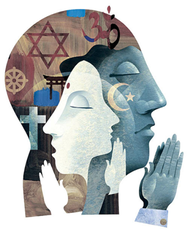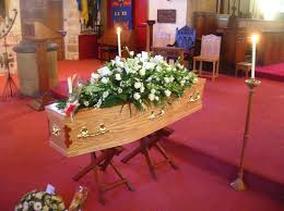
Pentecost, called such because it's the Greek translation of Shavuot, celebrates the overriding experience of the early followers of Jesus when they felt themselved empowered by the Spirit of Jesus which gave them insight into the message of Jesus and the courage to live it out. In a way it's similar to the festival of Shavuot, often thought to be a foundation moment for the Jewish community. For Christians the coming of the Holy Spirit is thought to be the foundation of the Church though the final separation of the Christian community from the Jewish community actually took many centuries.
The two festivals falling as they do at the same time this year illustrate a difference between the Jewish and Christian communities. For Jews law is at the heart of their religion and the Torah tells them how to live their life in accordance with God's will. They know what's expected of them. For Christians the important thing is to follow in the way of Jesus and discern what the Spirit of God is saying to them though Jesus didn't do away with the law. As a good Jew he was faithful to it but he stressed the spiritual side of it, that it couldn't be lived properly if it didn't come from the heart. Often the two religions are characterised as one being legalistic and the other as spiritual though I have heard some Jews describe this as a bit wishy washy. But both are necessary. To keep the letter of the law without the spirit, without it being an expression of a desire to live a good life is rather pointless - at least that's what Christians believe - but anyone who thinks they're living a 'spiritual' life and breaks the law is not living by the Spirit of God whose presence is characterised by love, justice, peace, equality, compassion, fidelity, courage. It's a question of emphasis rather than difference.
This year I'll be celebrating both festivals. Tomorrow evening I'm going to the Synagogue for Shavuot. After the service and meal there'll be an interfaith panel to discuss the ten commandments and/or the ten most important teachings of our faiths. The Ten commandments are of course also Christian and provide for us a framework for living as much as the Jewish community. Even so it's been an interesting exercise to work out what I think are the important teachings of my faith - expressed in personal rather than formal terms. I didn't do it in terms of commandments or laws but rather as the beliefs that form the foundation and principles for my faith and actions. While I won't list them all here ( though I might in a future blog, especially after the event) I was struck by how much the idea of death formed part of it. 'Remember that you are dust and into dust you shall return' is important to me and the foundation for understanding that power, reputation, greed has no lasting significance and to seek them is an illusion. It helps me understand that I am part of a great network of relationships that includes the created world which I must treat with reverance and respect. It helps me understand that all people, created as they are in the image and likeness of God, are equal and the work for justice and reconciliation in all its forms is an expression of this. While it doesn't give me a list of actions it gives me inspiration to try to live in such a way that I'll be living within the law. We'll see tomorrow evening how other faiths respond to this.




 RSS Feed
RSS Feed
